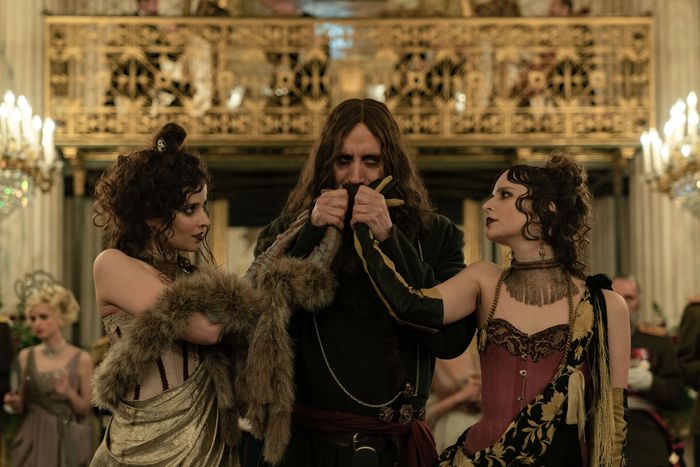
The KingÔÇÖs Man is a prequel to the 2014 and 2017 Kingsman movies that answers the question of how the franchiseÔÇÖs eponymous bespoke suit-wearing superspy organization came to be. It doesnÔÇÖt, however, get around to other urgent queries, like ÔÇ£Was anyone actually asking that?ÔÇØ and also ÔÇ£ShouldnÔÇÖt a prequel have at least some of the qualities that made people like the other films?ÔÇØ These days, even middling franchises get treated as precious commodities that have to be nurtured like hothouse flowers. But this middling franchise (directed by Matthew Vaughn and based on a Mark Millar and Dave Gibbons comic) barely had enough ideas to sustain one direct sequel, much less an installment that loses previous stars Colin Firth and Taron Egerton, as well as most of the edgelord-tinged humor that, like it or loathe it, did seem to be the main selling point. Kingsman: The Secret Service and its follow-up, The Golden Circle, were nominal send-ups of James Bond that imagined a tracksuited working-class hero in the place of the suave secret agent. But this new film drops any pretense of satire, content instead to be a dreary knock-off in period costume that doubles as an embarrassing work of wish fulfillment for anyone who just wishes Bond could be more overtly royalist.
Maybe thatÔÇÖs why Ralph Fiennes looks so pained throughout The KingÔÇÖs Man, which Vaughn co-wrote with Karl Gajdusek ÔÇö he wears the barely perceptible grimace of someone trying and failing to excuse themselves from an unpleasant cocktail hour. His character, Orlando Oxford, is a reluctant duke who begins the film as a committed pacifist but heartwarmingly learns to overcome his hard-won moral stances in order to hurl people off cliffs by the end. After a preface in South Africa in 1902 relieves Orlando of his narratively inconvenient wife, the film skips ahead a dozen years to find OrlandoÔÇÖs now-teenage son, Conrad (Harris Dickinson), chafing against his fatherÔÇÖs protective tendencies. There is something contradictory about the way heÔÇÖs being trained in the art of knife-fighting by OrlandoÔÇÖs man-servant, Shola (Djimon Hounsou, seemingly unable to escape this type of role), but forbidden from straying far from the family estate. Eventually, Orlando lets his son in on the truth, which is that heÔÇÖs been running a DIY intelligence operation with the help of Shola and ConradÔÇÖs alarmingly capable nanny, Polly Wilkins (Gemma Arterton), relying on a network of domestic workers apparently happy to spy in the highest halls of various governments on behalf of some English peer and his devoted servants. How or why this works is incidental ÔÇö thereÔÇÖs mischief afoot, and itÔÇÖs the fault of a consortium of historical figures who, for some reason, follow a shadow-shrouded, Scottish-accented leader referred to as the Shepherd.
The end goals of VaughnÔÇÖs villains throughout this series have been revealing. In the first film, Samuel L. JacksonÔÇÖs character aimed to stop climate change by culling the global population; in the second, Julianne MooreÔÇÖs tried to end the war on drugs in order for her cartel to rule the market without prosecution; and the Shepherd wants Scottish independence. Given that Orlando spends the first half of the movie rueing his blood-soaked involvement in colonial efforts as a younger man, youÔÇÖd think heÔÇÖd have at least a little sympathy for this last goal. But The KingÔÇÖs Man manages to be skeptical of governments while maintaining an intense loyalty to the idea of nations, gentlemen, and the status quo. While the baddies rail, entirely reasonably, about those who ÔÇ£only rule to the fortune of birth,ÔÇØ Orlando admits to Conrad that their ancestors were ÔÇ£terrible peopleÔÇØ while treating that fact as motivation to behave better, not cede any of his wealth or power. Tom Hollander appears as King George, Kaiser Wilhelm, and Tsar Nicholas, and while he plays the latter two as fools, the film still seems to believe theyÔÇÖre the best their respective countries can do. ItÔÇÖs barely worth raising an eyebrow when Vladimir Lenin (August Diehl) turns up alongside Mata Hari (Valerie Pachner), Erik Jan Hanussen (Daniel Br├╝hl), and Grigori Rasputin (Rhys Ifans), to reveal that Bolshevism is just another part of the ShepherdÔÇÖs master plan.
Despite all this, the real sin of The KingÔÇÖs Man is its near-total lack of fun. ItÔÇÖs a movie that wants to bemoan the monstrousness of war while also trying to pack in kick-ass action set pieces, and the result is that the former feels wildly insincere while the latter are just uninspired. The only aspect of the movie that has any electricity to it comes from a fight scene in which Rasputin, played by a scenery-chewing Ifans as a pansexual goth with real mystical powers and a crucifix that dispenses opium, busts out some impressive dance-inspired moves. ItÔÇÖs silly and kinetic and, for a moment, the movie seems to actually know what it wants to be, more than just a limp installment in a series already scheduled to spawn a fourth film, as well as an American spinoff, and a possible TV series. Then it trudges along for another hour, fleshing out mythology that was half-assed by design. All to build out a fictional world that no one involved seems to actually want to spend time in.
More Movie Reviews
- Flow Is an Animal Adventure ThatÔÇÖs Endearing and a Little Too Pretty
- Alien: Romulus Gets the Job Done, But at What Cost?
- Blitz Is the Worst Movie Steve McQueen Has Made


